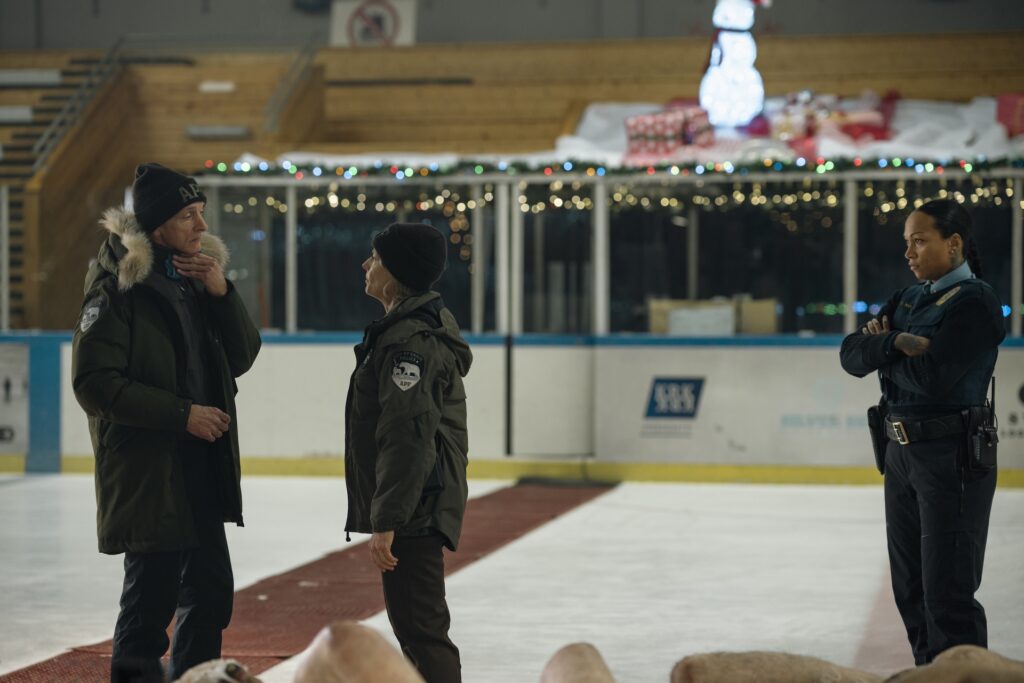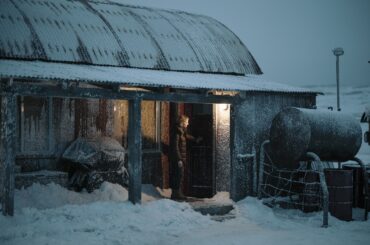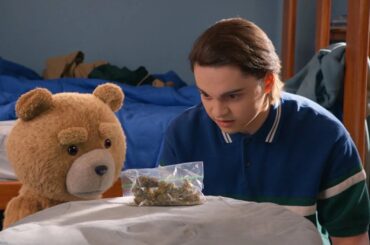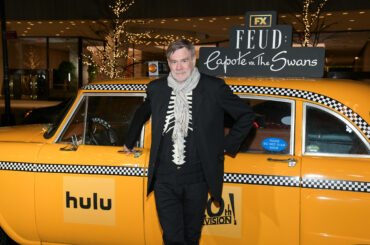True Detective Night Country is the latest installment in HBO’s Award-Winning Crime Anthology. It stars 2 time Academy Award Winning Actress Jodie Foster as Detective Liz Danvers and former professional boxer Kali Reis as Detective Evangeline Navarro. This season also stars legendary character actor John Hawkes, who has over 140 credits in a 40+ year career full of humanistic memorable performances.
Hawkes was nominated twice for the Academy Award for Best Supporting Actor for Winters Bone and The Sessions. He is perhaps best known for his role on HBO’s iconic western series Deadwood but is also well known for dozens of memorable character parts in films like American Gangster, Miami Vice, Identity, The Perfect Storm, The Amateurs, and From Dusk Till Dawn.
Hawkes is also an accomplished musician who has been playing music even before his acting career. In the ’80s, he was in the band Meat Joy and more recently King Straggler. As his acting career advanced he contributed many songs to several movies, including Peanut Butter Falcon, Unlovable, Winters Bone, Too Late, and Martha Marcy May Marlene. Hawkes composed the song “No Use” for True Detective: Night Country, and it is a beautiful song that sounds like it could be a lost Johnny Cash or Leonard Cohen track. His singing voice is as honest and as haunting as his acting style and sets the tone for this entire season.
Hawkes recently sat down for a Zoom chat with Immersive. The conversation has been edited for clarity.
How did you get involved with True Detective Night Country?
I got involved with True Detective through Issa López, who created the show wrote much of it, and directed all of it. She contacted me and wrote a nice letter describing Hank and saying she’s interested in broken people who end up being breakers themselves and thought that I would be able to serve. I took some time to figure it out and read it. It was amazing, an amazing script. Jodie Foster was involved, a huge fan of hers, and just really loved the writing, and so I was in.
What did you appreciate about working with Issa López?
Issa is just an extraordinary talent. When I begin a project, I’m always basically thinking, is this a story I want to be part of? Is the story well written? Is there a role that interests me and that I feel I could serve the project in playing that role. And then I also, the third thing is to look for really great storytellers. Jodie Foster’s a great storyteller as an actor and director, and Issa had made a movie called Tigers Are Not Afraid and when I watched that film, I knew that I’d be in the hands of a great storyteller. So at that point, and then going to Iceland was also an exotic thought, and living there for six months seemed like a really interesting challenge.
What’s unique about collaborating with Jodie Foster? I think she’s kind of in a league of her own.
I grew up watching her and just watched her amazing trajectory as an artist and working with her was everything I’d hoped that would be, I would say she’s personable, really hardworking, a very giving person, and just interested in telling the story in the best way possible. So I’d expressed to Issa that early on before I accepted the role, that playing dark characters pretending to be someone in that kind of turmoil is hard on me as I’ve gotten older, and there’s a period afterward sometimes where I don’t know why I feel ill or depressed.
I think it’s because our minds when we’re working as actors, understand that we’re part of a fictional story, but our bodies don’t get that. Issa told me, “I spoke to Jodie about your trepidation about playing such a really hard and dark character to go to the places you need to portray that role, and she promises that she’ll make you laugh every day on set,” and she did.
For you, what nuances defined Hank?
When got the script, he was a guy who wore his chauvinism on his sleeve. I felt it would just serve the whole story better and his relationship with Danvers and with his son if he was a little more nuanced and a little more finely drawn. So before I ever met Issa and went to Iceland, we had a couple of meetings while I was deciding whether or not to do the part. When I accepted, we had a couple more meetings, and I usually kind of create a backstory for the character. I’m playing alone.
This was a unique situation in that I was just bouncing ideas off of Issa and kind of throwing them out as what-ifs. And then a new script would come and they would be in there. The idea that Peter’s, my son’s mother, former wife, didn’t die, or that we’d had a bad parting she’d left us. The idea that Hank cut Annie’s tongue out was an idea I’d thrown out. Suddenly, these things are right into the script. So Issa was, I guess, formative in Hank’s backstory, and those things, again went right into the story.
How did the song come about?
Early on, Issa said, “What if Hank played the guitar? It would be cool if you wrote an instrumental piece that would score a certain scene that would score Danvers and Navarro, checking out the ice caves, and also going into the mining protest.” So I wrote something for her. I got it on a voice memo thing and sent it to her, and she loved it. She said, “That’s fantastic,” so that was that. I thought, here’s a guy in his living room playing the guitar a little bit and a quiet moment. And then we go to other scenes, and that guitar scores the scenes perfectly.

How did the lyrics come into place?
A couple of weeks after we began to shoot, I played a show in Iceland. I played a concert, and Issa came, and afterward, he said, well, “Now Hank’s got to sing.” I’d say, “There aren’t any words to that song. It’s a piece of score, not happening. Sorry.” It’s going to be performative and strange to see a guy suddenly just sing a song in his living room. Well, luckily, I remember at some point that Issa is much smarter than I am, and I decided to trust her and came up with a melody and some words to the song fairly last minute, I mean a couple of weeks to play around with it, and glad that she prevailed.
How long have you been playing music?
I’ve been playing in bands since 1982, and a band that I was in that split up in ’85 got together this year and played some shows, actually different kind of music that was, we didn’t quite even understand how to play instruments yet. That band’s called Meat Joy.
And you have songs in films as well.
If I started adding it up in a lot of small indies and stuff, it is a lot of songs. I did an independent film called Unlovable, and I wrote and performed eight songs in that movie. It wasn’t the first time, and hopefully not the last. I haven’t played a show since Iceland in front of people. It’s been a year, a little over a year, so I’m going to get back on that. I’m going to keep playing. I’m always interested in making sounds and writing songs.
Do you consider yourself a character actor? And what’s your relationship with that phrase? Is it something you like or don’t like?
A guy yesterday said, “Hey, has anyone ever told you you look like John Hawkes?” It is a strange thing to hear anyone ever ask you if you look like yourself. I was coy at first. It’s just such a strange way I didn’t quite know how to answer and then was in a public place. “No, I’d never heard that before.”
I ended up seeing the guy a little later and sort of said, “Yeah, didn’t mean to be coy, but…” He was like, “Oh my God, that is you.” It was kind of him since I said at first, “No, I’d never heard that before.” He said, “He is a great character actor,” and I kind of blanked a little when he said it yesterday. But yeah, it’s not a bad term to me.
Many of the best actors are character actors…
I think it implies range, and that’s kind of nice. You could argue that every actor is a character actor. They play a character, but I guess some play characters closer to themselves more often. And I guess I don’t, but more and more as I get older, I’m less interested in the extreme kind of accents and limps and prosthetics and things. I do enjoy playing characters a little closer to myself.
The magic of who could be called a character actor is you could either be in the most memorable scene in the movie or part of the background and sometimes both at the same time.
I agree. I guess that what I would say is I’m a character actor who sometimes plays leading roles. It is maybe the best way to do it because character actor kind of implies a sort of a lower standard of actor that I think is unfair. But even if I hadn’t gotten to play leads in films, I’d still be okay with it.
But yeah, I think that sometimes people have only seen one thing you’ve done. Someone might say, I love you in some tiny movie that I was in. That might be all they’ve ever seen. That’s okay, too. As long as you connect, as long as you get in with people.
True Detective: Night Country is now available to stream on Max.





